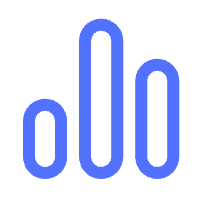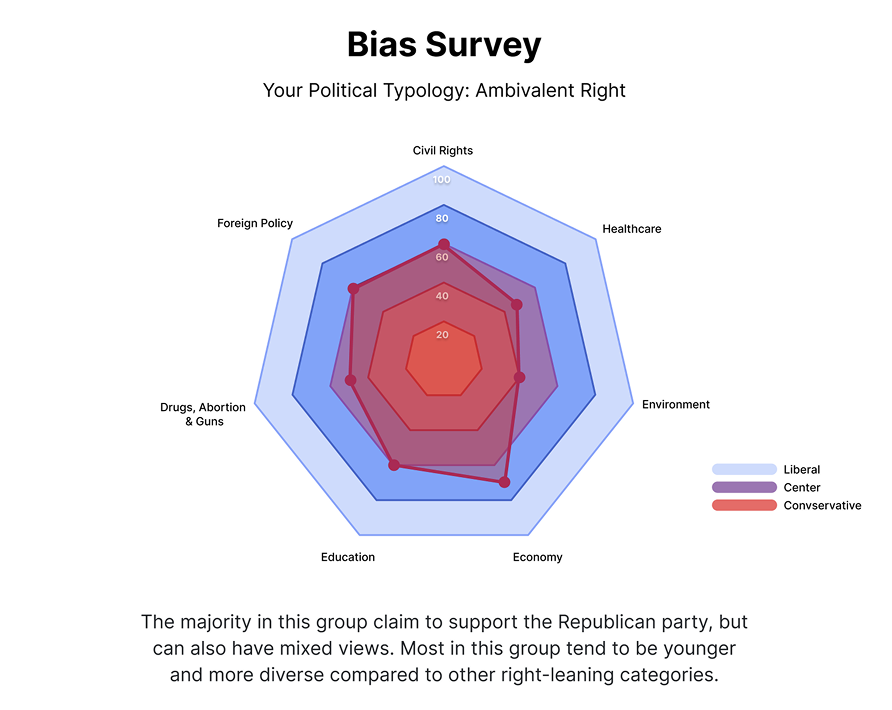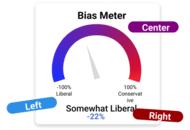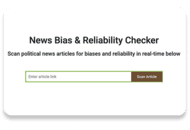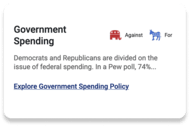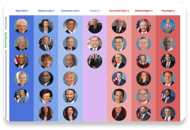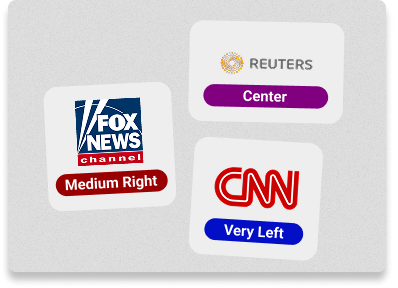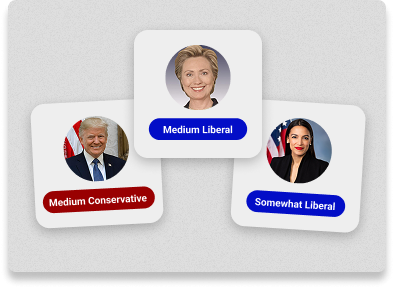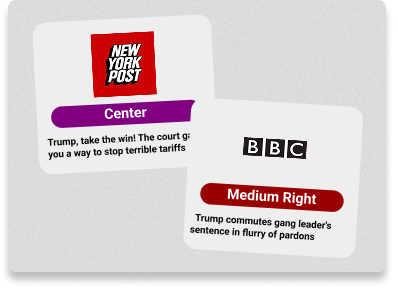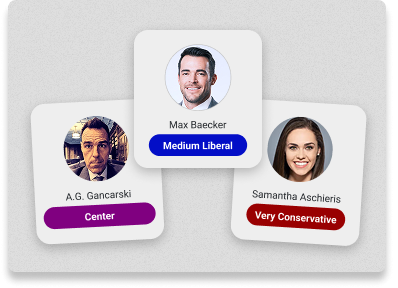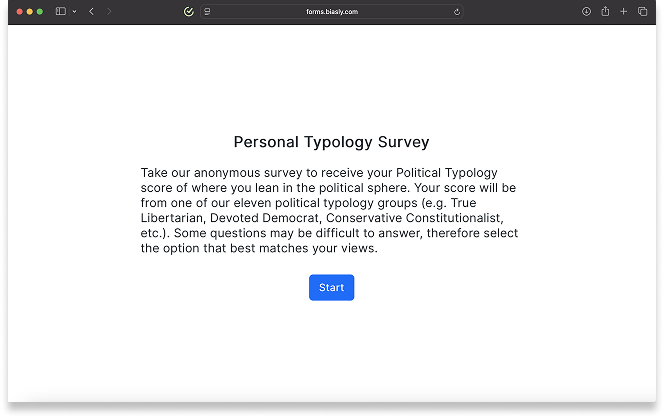What Is Your Political Typology?
Take Biasly’s Survey to Find Out.
In today’s hyper-polarized political climate, simply identifying as “liberal” or “conservative” doesn’t fully capture the complexity of an individual’s beliefs. Political opinions are shaped by a diverse range of social, cultural, and economic values—and these don’t always fall along party lines. If you’ve ever felt like your views don’t fit neatly into a single political box, you’re not alone.
To help make sense of this complexity, Biasly offers a powerful tool: the Personal Typology Survey. This free, research-driven quiz helps you understand where you fall in a broader typological spectrum of political belief systems. Whether you’re a moderate, populist, progressive, or somewhere in between, the survey helps you explore the core values that shape your worldview.
In this blog, we’ll explain the concept of political typology, why it matters, how the Biasly survey works, what your results mean, and how to apply this insight to your political engagement and media consumption.
In today’s hyper-polarized political climate, simply identifying as “liberal” or “conservative” doesn’t fully capture the complexity of an individual’s beliefs. Political opinions are shaped by a diverse range of social, cultural, and economic values—and these don’t always fall along party lines. If you’ve ever felt like your views don’t fit neatly into a single political box, you’re not alone.
To help make sense of this complexity, Biasly offers a powerful tool: the Personal Typology Survey. This free, research-driven quiz helps you understand where you fall in a broader typological spectrum of political belief systems. Whether you’re a moderate, populist, progressive, or somewhere in between, the survey helps you explore the core values that shape your worldview.
In this blog, we’ll explain the concept of political typology, why it matters, how the Biasly survey works, what your results mean, and how to apply this insight to your political engagement and media consumption.
What Is Political Typology?
Political typology refers to categorizing people based on shared political values, beliefs, and behaviors. Rather than sticking to traditional labels, typology digs deeper into how individuals think about the role of government, personal freedom, economic policy, cultural identity, and media trust.
This kind of classification offers a more accurate lens into American political identity. Someone who supports environmental protection but favors free-market healthcare may not fall squarely into either party. Political typology identifies clusters of people who share unique combinations of values, even if they cross partisan boundaries.
Biasly’s typology model is similar to Pew Research’s long-standing political typology studies but goes further by incorporating media trust, policy stance analytics, and ideological framing recognition—providing a more interactive and real-time understanding of political identity.
Understanding your typology can help you see where you stand within the wider political spectrum and why you may resonate with or reject certain ideas, parties, or media outlets.
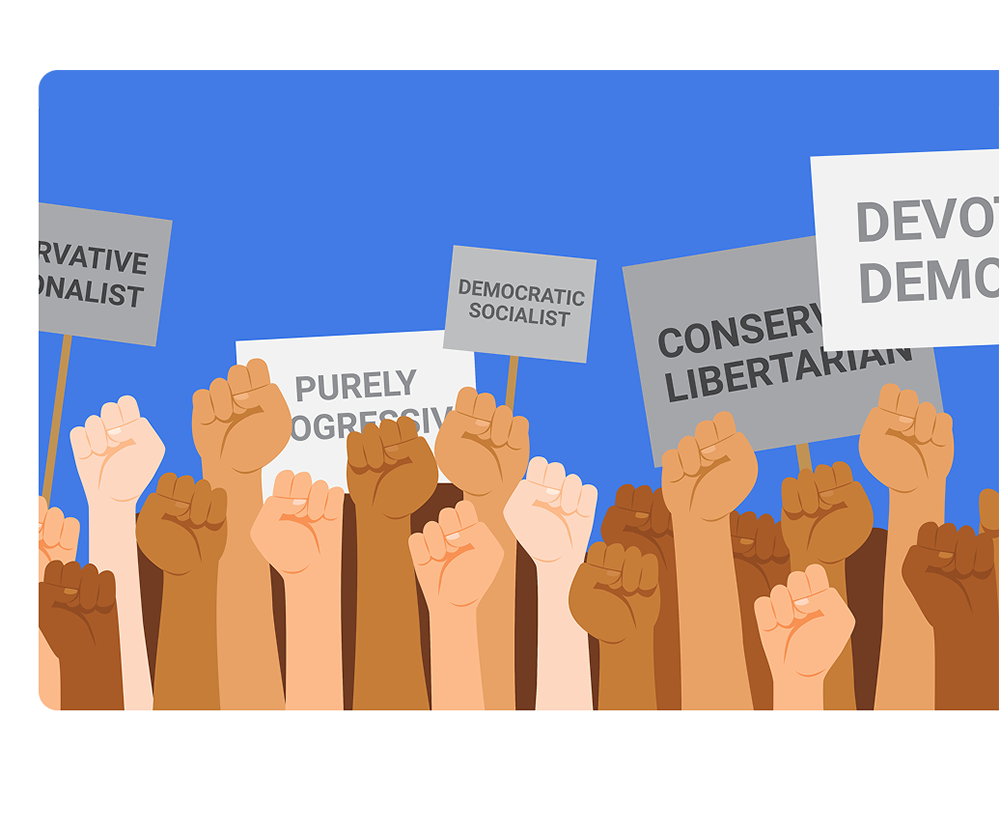
Why Political Typology Matters
Understanding political typology isn’t just a matter of curiosity—it’s a step
toward becoming a more informed and engaged citizen. Here’s why it matters:
Reduces Polarization
Understanding your typology and others' can increase empathy and reduce toxic political discourse.
Informs Voting Decisions
Typology helps you align your votes with your values, not just your party.
Improves Media Literacy
Knowing your typology helps you spot bias in the news and recognize when you're consuming echo chamber content.
Empowers Conversation
Understanding political nuance encourages better, more productive dialogue among people with differing views.
This is why Biasly integrates typology assessments as part of its mission to foster media transparency and political understanding.
Introducing the Biasly Personal Typology Survey
The Biasly Personal Typology Survey is a quick and engaging assessment that takes about 5 minutes to complete. Through a series of questions covering political, economic, and cultural issues, the survey maps your vi ews against a detailed spectrum of belief systems.
Once completed, it returns a result that places you into a defined political typology. Each typology includes a summary of core values, ideological tendencies, and media trust levels. The survey is designed to be accurate, nonjudgmental, and thought-provoking, offering clarity in a confusing political environment.
This tool is completely free, anonymous, and backed by real data analysis. You can even retake it later to see how your views have evolved over time.
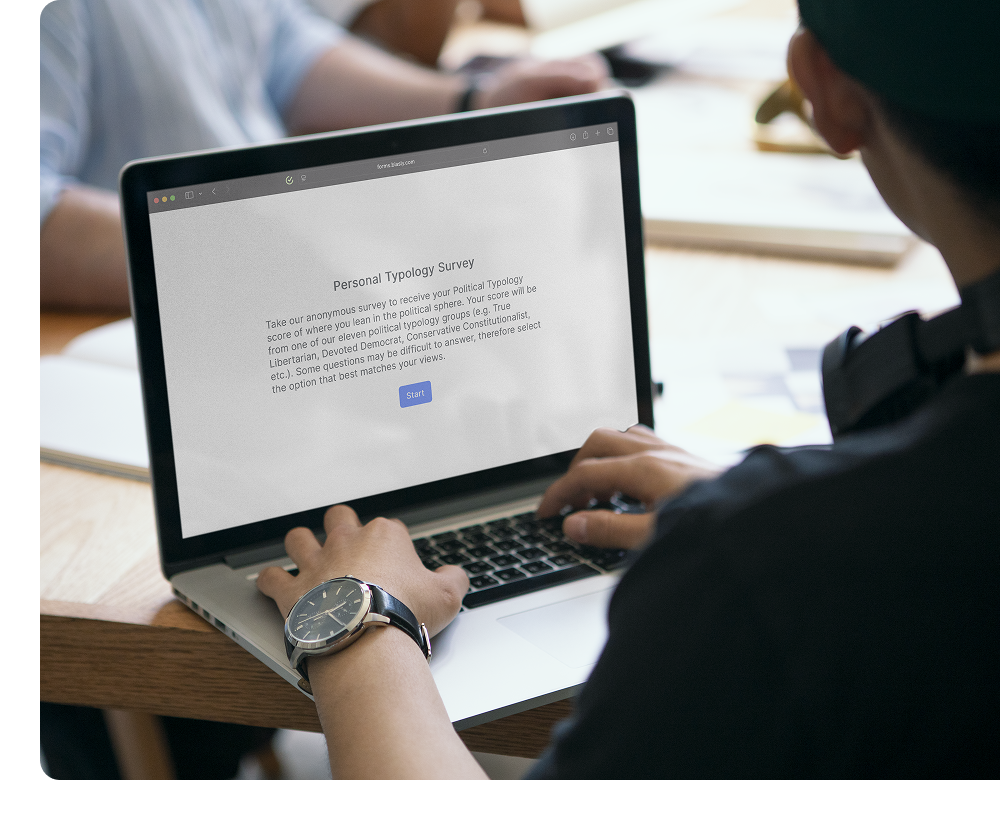
test
In today’s hyper-polarized political climate, simply identifying as “liberal” or “conservative” doesn’t fully capture the complexity of an individual’s beliefs. Political opinions are shaped by a diverse range of social, cultural, and economic values—and these don’t always fall along party lines. If you’ve ever felt like your views don’t fit neatly into a single political box, you’re not alone.
To help make sense of this complexity, Biasly offers a powerful tool: the Personal Typology Survey. This free, research-driven quiz helps you understand where you fall in a broader typological spectrum of political belief systems. Whether you’re a moderate, populist, progressive, or somewhere in between, the survey helps you explore the core values that shape your worldview.
In this blog, we’ll explain the concept of political typology, why it matters, how the Biasly survey works, what your results mean, and how to apply this insight to your political engagement and media consumption.
test
In today’s hyper-polarized political climate, simply identifying as “liberal” or “conservative” doesn’t fully capture the complexity of an individual’s beliefs. Political opinions are shaped by a diverse range of social, cultural, and economic values—and these don’t always fall along party lines. If you’ve ever felt like your views don’t fit neatly into a single political box, you’re not alone.
To help make sense of this complexity, Biasly offers a powerful tool: the Personal Typology Survey. This free, research-driven quiz helps you understand where you fall in a broader typological spectrum of political belief systems. Whether you’re a moderate, populist, progressive, or somewhere in between, the survey helps you explore the core values that shape your worldview.
In this blog, we’ll explain the concept of political typology, why it matters, how the Biasly survey works, what your results mean, and how to apply this insight to your political engagement and media consumption.
How the Survey Works: Biasly’s Methodology
Social Values
(e.g., equality, civil rights, cultural identity)
Economic Views
(e.g., taxation, free markets, welfare)
Institutional Trust
(e.g., faith in government, corporations, media)
Media Bias Perception
(e.g.,which news you trust and why)
Unlike traditional quizzes, this survey doesn’t rely on obvious partisan cues. Instead, it evaluates the nuance of how you respond to layered questions, resulting in a more accurate classification. Your final typology represents how your answers intersect across the four dimensions listed above.
The resulting match is drawn from Biasly’s well-researched typology categories, which are built from thousands of data points and tested through feedback and usage patterns.
Biasly’s Political Typology
Spectrum Explained
Once you complete the survey, you’ll receive a result that places you into one of the following typologies:
Left-Leaning
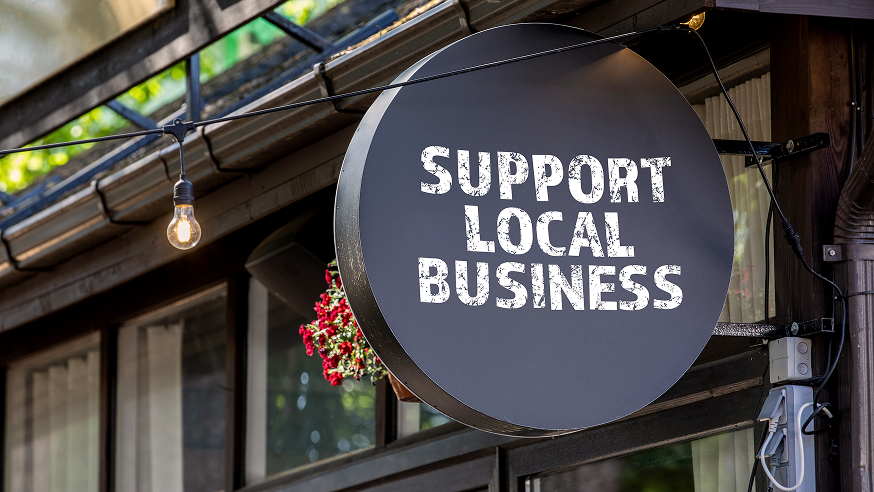
Democratic Socialist
Views tend to favor the left-leaning political philosophy. This group's views argue that the current capitalist ideals contradict values such as citizen benefits and economic privilege. This group seeks to reduce class distinctions and focuses on advocating equality for everyone.

Purely Progressive
Views are typically highly liberal compared to other Democratic parties and tend to be the most politically engaged. This group seeks to improve living conditions for citizens such as fighting for equality and accepting a more open immigration policy.

Devoted Democrat
Views strongly hold true to mainstream views of the Democratic party. This group is the most loyal to the party and its liberal ideologies.

Ambivalent Left
This group primarily supports the Democratic party and liberal policies, but can also have mixed views with some moderate and even conservative leanings.
Right-Leaning
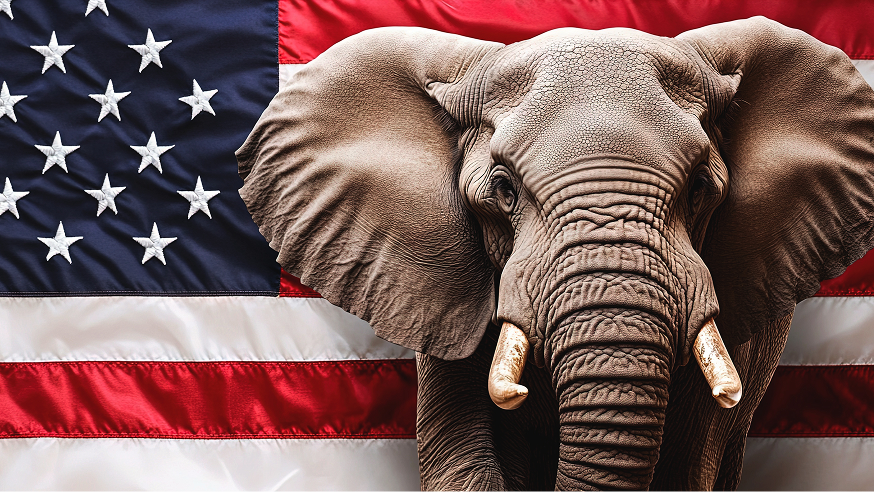
Core Conservative
Views strongly hold true to mainstream views of the Republican party. This group is the most loyal to the party and its conservative ideologies.
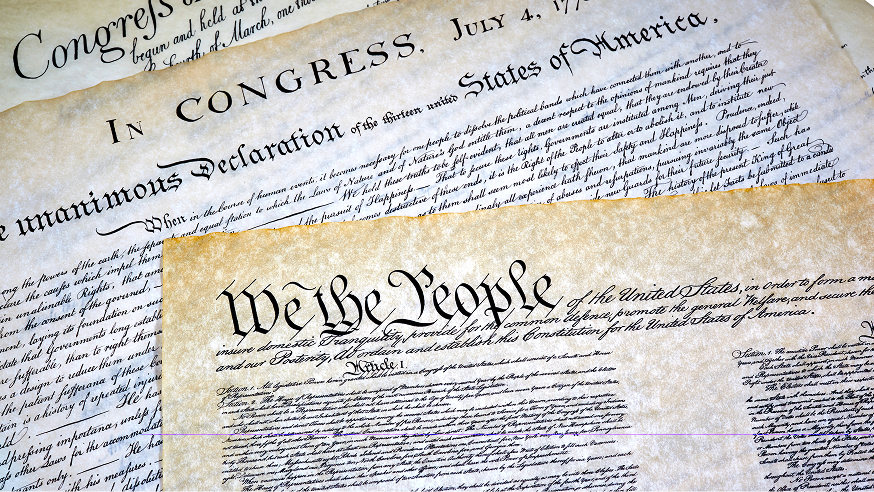
Conservative Constitutionalist
People within this category hold a strict interpretation of the U.S. Constitution expressed by the founding fathers of the United States, including a smaller government and limited powers of the federal government.

Ambivalent Right
The majority in this group claim to support the Republican party, but can also have mixed views. Most in this group tend to be younger and more diverse compared to other right-leaning categories.
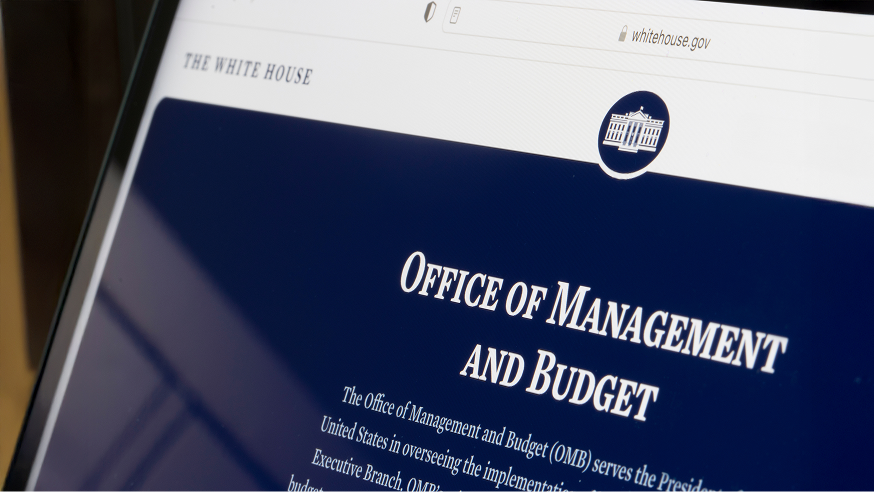
Fiscal Conservative
Individuals in this group are typically focused on economic factors such as reducing government spending and lowering the national debt. Unlike other conservatives, this group seeks to lower taxes, and the national debt and does not focus on social policies that compete with such fiscal conservatism.
Independent

Left Libertarian
This group is a branch of libertarianism that is a left-leaning form of libertarianism. Members of this group agree with most libertarian ideologies except the right to private property of natural resources. They believe we have equal rights over nature. These ideologies stress social equality and individual freedom.
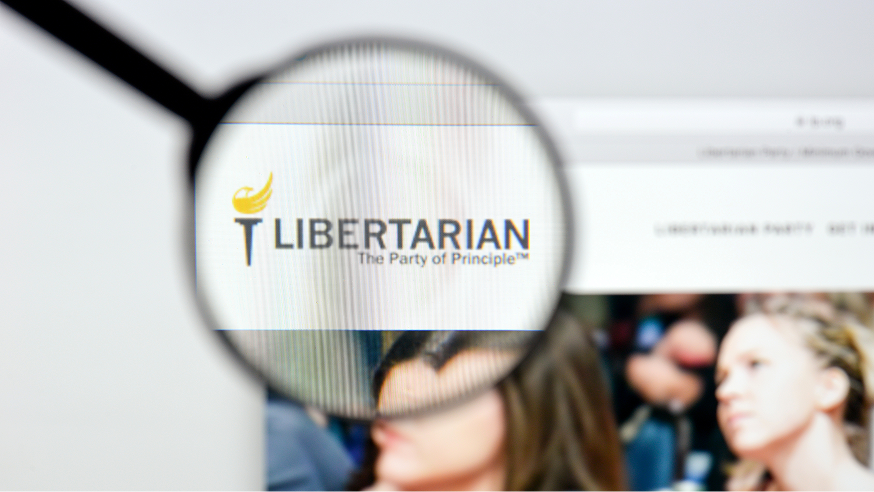
True Libertarian
This group tends to emphasize maximizing individual freedom and is skeptical of a large government. Political views are focused on minimal regulation, small government, and low government involvement.
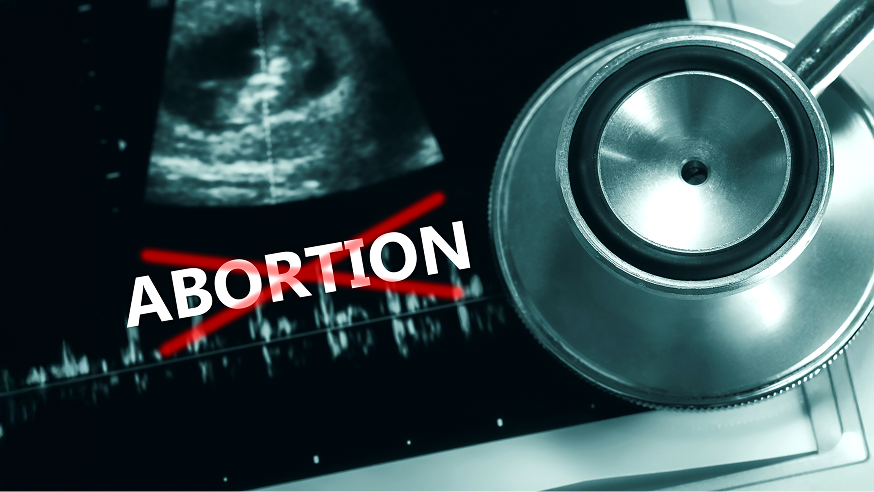
Conservative Libertarian
The philosophy of this political group combines conservatism and libertarianism. Members of this group may advocate for anti-abortion policies, economic liberty, and less government regulation.
How Typology Shapes Media Perception
One of the most insightful outcomes of understanding your typology is realizing how it shapes the way you view the media. Different typology groups don’t just prefer different news outlets—they interpret the same facts in different ways.
Biasly helps bridge that gap. Our Media Literacy Education Platform offers tools and articles that help users understand why they see bias where others may not—and how to correct for that.
Understanding your typology allows you to contextualize media bias not just in terms of the outlet, but also in terms of your own predispositions.
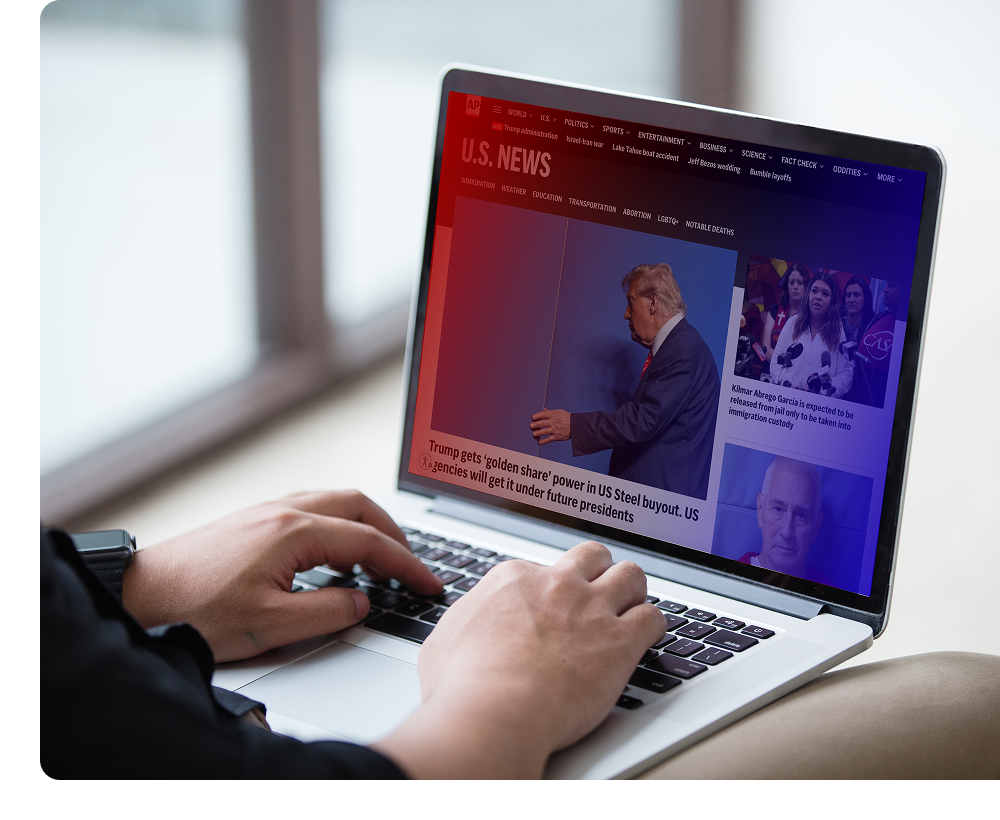
Real-Life Applications of Political Typology
Political typology isn’t just useful for media literacy. It plays a major role in:
Political Campaigns
Messaging is tailored to voter typologies, not just party registration.
Marketing
Brands align their messaging with typologies that reflect their consumers’ values.
Education
Teachers use typological models to teach civic literacy and promote ideological diversity.
Corporate Policy
Understanding employee typologies helps in DEI efforts, company culture, and internal communication.
By understanding your typology, you can better navigate political conversations, consumer decisions, and career choices that align with your values.
Using Your Typology to Become a Smarter Voter
Once you know your typology, you can approach elections with far greater confidence. Instead of voting based purely on party labels or soundbites, you can:
- Evaluate how a candidate’s platform aligns with your typology profile.
- Seek out unbiased comparisons of policies (use Biasly’s side-by-side political bias ratings).
- Participate in civic discussions with a clearer understanding of where you and others stand.
The more you know about your own bias, the easier it is to avoid confirmation bias, resist misinformation, and become a more principled political thinker.

Closing Thoughts: Know Yourself, Understand the World
Political typology is a critical tool for anyone seeking clarity in today’s noisy political environment. Instead of relying on party affiliation or cable news spin, you can ground your beliefs in a deeper understanding of your own worldview.
The Biasly Personal Typology Survey provides a starting point. By identifying your place on the political typology spectrum, you gain the power to:
- Think more critically about news and politics
- Engage more respectfully with others
- Consume media more intelligently
- Vote more authentically
So—are you ready to find out where you truly stand?

























